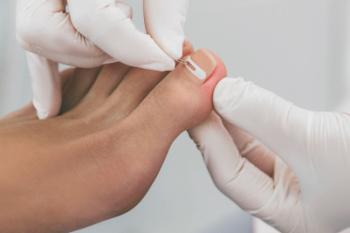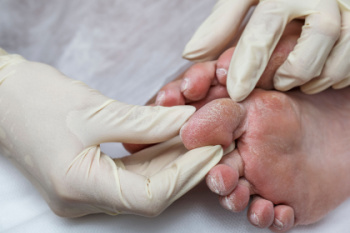Connect With Us
Blog
Facts About Ingrown Toenail Surgery

Ingrown toenails can be a source of discomfort and pain, often requiring medical attention from a podiatrist to alleviate symptoms and prevent complications. When conservative treatments fail to provide relief, surgery becomes a viable option. During the procedure, the offending portion of the nail is removed to prevent it from growing into the surrounding skin. It is important to note that ingrown toenail surgery is generally performed on an outpatient basis, meaning patients can return home the same day. Recovery times may vary, but patients can expect some discomfort and swelling in the days following surgery. However, diligent care of the surgical site and following post-operative instructions can expedite healing and minimize complications. Ultimately, ingrown toenail foot surgery offers a long-term solution for those suffering from persistent ingrown toenail pain. If you have an ingrown toenail that is causing you chronic discomfort, it is strongly suggested that you consult a podiatrist for an evaluation.
Foot surgery is sometimes necessary to treat a foot ailment. To learn more, contact one of our podiatrists of Foot & Ankle Associates of Maine. Our doctors will assist you with all of your foot and ankle needs.
When Is Surgery Necessary?
Foot and ankle surgery is generally reserved for cases in which less invasive, conservative procedures have failed to alleviate the problem. Some of the cases in which surgery may be necessary include:
- Removing foot deformities like bunions and bone spurs
- Severe arthritis that has caused bone issues
- Cosmetic reconstruction
What Types of Surgery Are There?
The type of surgery you receive will depend on the nature of the problem you have. Some of the possible surgeries include:
- Bunionectomy for painful bunions
- Surgical fusion for realignment of bones
- Neuropathy decompression surgery to treat nerve damage
Benefits of Surgery
Although surgery is usually a last resort, it can provide more complete pain relief compared to non-surgical methods and may allow you to finally resume full activity.
Surgical techniques have also become increasingly sophisticated. Techniques like endoscopic surgery allow for smaller incisions and faster recovery times.
If you have any questions please feel free to contact our office located in Brunswick, ME . We offer the newest diagnostic and treatment technologies for all your foot and ankle needs.
Foot and Ankle Protection for Golfers

Golf, a sport renowned for its precision and finesse, demands proper foot and ankle protection to optimize performance and prevent injuries on the course. As golfers traverse various terrains and weather conditions, selecting appropriate footwear is vital. Choose golf shoes with sturdy yet flexible soles that provide traction on grass and uneven surfaces, ensuring stability during swings and walks. Look for designs with ample cushioning and arch support to mitigate the impact of repetitive motions and reduce the risk of foot fatigue or discomfort throughout the round. Consider weather-resistant options to keep feet dry and comfortable in inclement conditions. Additionally, prioritize shoes that offer ankle support to minimize the risk of sprains or twists during swings and uneven terrain navigation. Regularly inspect and replace worn-out footwear to maintain optimal protection and performance. By investing in quality golf shoes that prioritize foot and ankle protection, golfers can enhance their experience on the course and enjoy their game to the fullest. If you are seeking specific information about what type of shoes provide maximum protection while playing golf, it is suggested that you confer with a podiatrist.
Ankle and foot injuries are common among athletes and in many sports. They can be caused by several problems and may be potentially serious. If you are feeling pain or think you were injured in a sporting event or when exercising, consult with one of our podiatrists from Foot & Ankle Associates of Maine. Our doctors will assess your condition and provide you with quality foot and ankle treatment.
Common Injuries
The most common injuries that occur in sporting activities include:
- Achilles Tendonitis
- Achilles Tendon Rupture
- Ankle Sprains
- Broken Foot
- Plantar Fasciitis
- Stress Fractures
- Turf Toe
Symptoms
Symptoms vary depending upon the injury and in some cases, there may be no symptoms at all. However, in most cases, some form of symptom is experienced. Pain, aching, burning, bruising, tenderness, tightness or stiffness, sensation loss, difficulty moving, and swelling are the most common symptoms.
Treatment
Just as symptoms vary depending upon the injury, so do treatment options. A common treatment method is known as the RICE method. This method involves rest, applying ice, compression and elevating the afflicted foot or ankle. If the injury appears to be more serious, surgery might be required, such as arthroscopic or reconstructive surgery. Lastly, rehabilitation or therapy might be needed to gain full functionality in the afflicted area. Any discomfort experienced by an athlete must be evaluated by a licensed, reputable medical professional.
If you have any questions, please feel free to contact our office located in Brunswick, ME . We offer the newest diagnostic and treatment technologies for all your foot care needs.
We Can Treat Your Foot or Ankle Pain
The Impact of Diabetes on Foot Health

Diabetes poses significant risks to foot health, highlighting the importance of vigilant care and preventive measures. Elevated blood sugar levels can damage nerves, known as neuropathy, and reduce blood flow, impairing sensation and circulation in the feet. Neuropathy diminishes the ability to feel pain, heat, or cold, increasing the likelihood of unnoticed injuries or wounds. Additionally, reduced blood flow hampers the body's ability to heal, increasing the risk of foot infections and ulcers. Diabetes also heightens susceptibility to foot complications like corns, calluses, and fungal infections due to impaired immune function. Charcot foot, a severe condition characterized by weakened bones and joint deformities, is another complication of diabetes that can lead to disability without proper care. To mitigate these risks, individuals with diabetes must adopt a comprehensive foot care regimen. If you have diabetes, it is strongly suggested that you are under the care of a podiatrist who can help you to manage the effects of this condition on your feet.
Diabetic foot care is important in preventing foot ailments such as ulcers. If you are suffering from diabetes or have any other concerns about your feet, contact one of our podiatrists from Foot & Ankle Associates of Maine. Our doctors can provide the care you need to keep you pain-free and on your feet.
Diabetic Foot Care
Diabetes affects millions of people every year. The condition can damage blood vessels in many parts of the body, especially the feet. Because of this, taking care of your feet is essential if you have diabetes, and having a podiatrist help monitor your foot health is highly recommended.
The Importance of Caring for Your Feet
- Routinely inspect your feet for bruises or sores.
- Wear socks that fit your feet comfortably.
- Wear comfortable shoes that provide adequate support.
Patients with diabetes should have their doctor monitor their blood levels, as blood sugar levels play such a huge role in diabetic care. Monitoring these levels on a regular basis is highly advised.
It is always best to inform your healthcare professional of any concerns you may have regarding your feet, especially for diabetic patients. Early treatment and routine foot examinations are keys to maintaining proper health, especially because severe complications can arise if proper treatment is not applied.
If you have any questions please feel free to contact our office located in Brunswick, ME . We offer the newest diagnostic and treatment technologies for all your foot and ankle needs.

